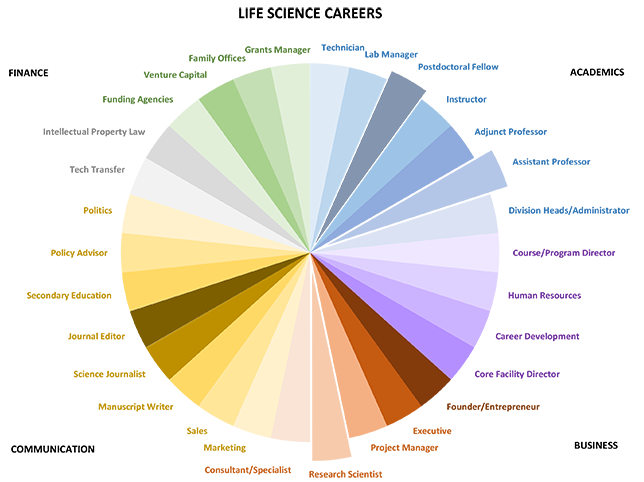The following is an excerpt from a talk I gave at the Mentor Celebration Event at Brigham and Women’s Hospital in Boston, MA on May 23, 2016. Due to length, I have broken it up into three parts. What follows is the first part:
Part 1: Training, Life sciences careers, and academics
PhD and postdoctoral training is among the best in the world. It takes the smartest, most self-motivated, ambitious and creative people from all walks of life, every age and nationality, both women and men, and it fosters independent thought and structured expression. It emphasizes self-reliance and collaboration. It achieves the foundations for paradigm-changing events in our history, reproducibly, and concentrates them through mostly self-selection, in centers of excellence. It does everything every employer, institution, and government has ever wanted, consistently, for generations, and it does it so well, that these brightest minds and most well-equipped people of our generation feel inept, insecure, and unqualified of anything but the most specific of jobs – bench scientist. If lucky – director of bench scientists.
The idea that we should be so well educated, trained, and allowed to do basic research on mostly federal (i.e. public) support, without doing more with this knowledge is ridiculous. The world only needs so many basic research scientists – there is so much more that’s expected of the rest of you.
The most common question young scientists struggle with today coming out of academic centres is the choice between academia and industry. It’s a false choice. The problem is propagated by a fundamental lack of knowledge of career options.
Yes, these are two options, but not only are they not the only ones. They are also the least attractive. Careers in the life sciences are best discussed and considered in terms of a continuum, with different parts supporting each other to make our system work. Have a look:

It is important to emphasize that this is not a comprehensive list. Nevertheless, there are generally four sectors that those in the life sciences often find careers in, and a large number of careers that blend sectors within this space:
- Academics
- Business
- Communication
- Finance
Academics
The path you will be most familiar with is the academic track. Here there are technicians, lab managers, postdoctoral fellows, instructors, adjunct professors, assistant professors, and division heads/administrators. The scope, pay, expectations, and career advancement opportunities vary significantly if work is being performed in a university or a dedicated research institute. It’s also important to note that smaller institutions behave very differently from larger institutions in all respects, and constitute very different jobs. This is also true of differences between public, federal, or private institutions. It is also important to remember that private universities and research hospitals are themselves large for-profit companies and function in many similar capacities.
Research or hybrid research/education track assistant professor is what is typically implied when using the term ‘academia’ in relation to career development. Nevertheless, academic labs operate like small businesses, with comparable budgets, number of staff, and resources. To compare the two: positions typically occupied by students in academic institutions are assumed by research scientists with similar qualifications and backgrounds in small companies.
While collaborations in academia and industry work the same way, companies tend to make better use of consultants/specialists to advance project goals in more formalized engagements. Likewise, division administrators play the role of company executives, principal investigators operate like project leads, and postdocs serve as project managers. The biggest differences are typically the focus and timeline for research projects (academic projects are typically much broader and take longer to complete), resources available to projects (academic projects tend to be under-funded), and priorities of work (publication versus product). Job security is comparable. Salaries for academics are poor.
Within larger institutions there are often course/program directors, human resources, career development, and core facility directors. While the former typically operate as divisions within the larger company, core facilities are worth talking about because they are often run as small businesses, and have more in common with startups than they do with academia. This applies to veterinary facilities as well. Universities and private companies have both noted this and have begun creating incubators, which are themselves small companies that operate at the interface between research institutes and startups, typically providing access to core facilities and equipment at a nominal fee.
I will talk about the remaining sectors in my next post. Stay tuned for it in the coming weeks.

Another lateral move more scientists should consider is data science. About two years ago I started picking up coding skills: MATLAB, R, Python, SQL. After a short post-doc I got a senior analyst position with our provincial health authority. My PhD is in Neuroscience, not Comp Sci, Math, Statistics or Public Health. I realize data science is not for everyone, but such positions require many of the skills PhD’s already have. Yes, you may have to put in some extra work to learn computer programming, but the pay is far better than academia and there is great opportunity to advance if you use your PhD-ness to keep pushing and learning. For instance, many traditional data analysts like numbers and spreadsheets, but fear unstructured data like text. So, I am developing my analytic abilities with non-structured data to put myself above the crowd. Anyways, something to think about for the data geeks out there.